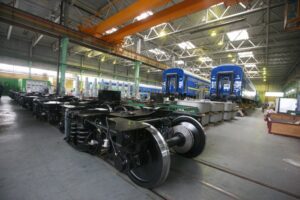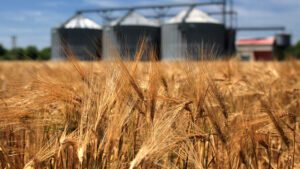
The State Aviation Service of Ukraine has granted the new Ukrainian airline Bees Airline the rights to operate the Kyiv – Lviv – Kyiv, Kyiv – Odesa – Kyiv and Kyiv – Kherson – Kyiv airlines. Order of the State Aviation Service No. 655 dated April 26, 2021 was published on its website.
According to the document, the frequency of these flights and the duration of the rights are not limited.
As reported, the State Aviation Service of Ukraine issued an operator certificate to Bees Airline on March 12, 2021. Later, the regulator allowed the company to operate flights on 31 routes – 15 regular and 16 charter flights.
Bees Airline made its first charter flight from Kyiv to Sharm el-Sheikh (Egypt) by order of the tour operator Tez Tour Ukraine on March 18, 2021.
According to the public register of civil aircraft of Ukraine, Bees Airline registered two aircraft in Ukraine – Boeing 737-800 with registration numbers UR-UBA and UR-UBB. Both aircraft are produced in 2010 and belong to San Clemente Leasing LLC (the United States).
According to Bees Airline CEO Yevhen Khainatsky, by the end of 2021 the fleet will be replenished with two more aircraft. Another two are planned to arrive in 2022.
The base airport of Bees Airline is Kyiv International Airport named after Ihor Sikorsky.
According to the data in the register, the beneficial owners of Bees Airline are Serhiy Smirny (90%) and Khainatsky (10%).
Previously, Khainatsky was CEO of another Ukrainian airline – SkyUp Airlines.

From Saturday, May 1, Kyiv plans to weaken quarantine restrictions, said mayor of the capital Vitali Klitschko during a briefing.
“This morning, the State Commission on Environmental Safety, Manmade Disaster and Emergency Response of the city decided to weaken anti-epidemic measures in the capital. We hope that the State Commission will also decide to review the level of epidemic danger and withdraw the capital from the ‘red’ zone,” the mayor’s press service quoted him as saying.
Klitschko noted that from May 1, all ground public transport and the metro will restore passenger transportation in the usual mode.
“In compliance with previously defined anti-epidemic norms and rules. But I urge residents of the capital to use public transport only in case of emergency,” the mayor of Kyiv said.
He noted that from May 1, the operation of trade establishments, shopping and entertainment centers, markets, fairs, catering establishments, gyms and fitness centers will be restored.
“However, the owners of these establishments must understand that they work only in compliance with all safety standards! It is in your interests, because if the situation worsens again, new restrictions cannot be avoided!” stressed Klitschko.
The mayor of the capital also said that Administrative Service Centers will resume their work, however, they will host visitors by appointment through electronic services.
“From next Wednesday, May 5, the city will restore the educational process in general education institutions, preschool and higher educational institutions. Also, the capital will restore the acceptance of documents for enrolling children in the first grade for the next academic year,” the mayor of Kyiv said.

JSC Dniprovahonmash (Kamianske, Dnipropetrovsk region), a large car-building enterprise of Ukraine controlled by the TAS financial and industrial group, sold 825 freight cars in 2020, which is 58.3% less than a year earlier (1,944 units).
According to the financial statements of the enterprise published in the National Securities and Stock Market Commission, the production of railcars over the past year decreased even more – by 61.5%, to also 784 units for UAH 957.4 million.
The average selling price of the car was UAH 1.22 million. The plant exported 7.3% of the sold wagons for the amount of UAH 73.1 million.
Among the Ukrainian clients of the plant are TAS-Logistic, OTP-Leasing, Ukrtransleasing.
As reported, in 2019 the plant sold 1,944 freight cars (16% less than a year earlier) and produced 2018 cars (12.7% less) for UAH 2.871 billion.
According to the report, the unconsolidated net income of JSC Dniprovahonmash (excluding subsidiaries) in 2020 decreased 64.3%, to UAH 1.004 billion, the net loss amounted to UAH 110.92 million versus the net profit of UAH 413.62 million a year earlier.
The share of the plant’s cars of the total production of freight cars in Ukraine reached 26%.
Describing the situation on the Ukrainian car building market in 2020, the company noted a continuing trend towards a reduction in car production due to a drop in freight turnover in rail transport, a lack of traction stock at Ukrzaliznytsia due to its deterioration, and the presence of used Russian cars with an expired service life, as well as increasing the period of carriage turnover.

Minister of Agrarian Policy and Food of Ukraine Roman Leshchenko proposes to reduce the VAT rate from 20% to 14% on all types of agricultural products in order to reduce the cost of socially significant food products, while the ban on exports of sunflower seeds is, in his opinion, an illegal measure.
“Responsible state policy in this case is systemic measures to reduce prices for all socially significant food products that are included in the food basket of the Ukrainian consumer. All over the world and, above all, in the EU, this is achieved by the introduction of a reduced VAT rate for such products. Our proposal is to establish a 14% VAT rate on all types of agricultural products without any exceptions,” the minister wrote on his Facebook page on Friday, April 23.
Leshchenko noted that the “Soviet” practices of administrative regulation, like the draft resolution banning exports of sunflower seeds from May 15 to September 30, 2021, published for discussion on the website of the Economy Ministry, have a negative effect in a market economy.
“The ban on sunflower exports is an illegal measure, because, according to the current legislation, the basis for its introduction is a violation of the market equilibrium. However, there is no sunflower deficit in Ukraine!” he wrote.
Leshchenko said that the export ban also creates the preconditions for a monopoly conspiracy – concerted anti-competitive actions that the state must fight against. “An attempt to reduce the cost of a separate product at the expense of Ukrainian farmers is a dangerous measure that not only threatens the development of the agricultural industry and does not solve the problem comprehensively, but can also lead to the fact that the state will be forced to compensate farmers for losses caused by such unreasonable decisions,” Leshchenko said.

Consignors – which can only be Gazprom – have not been interested by offers of additional capacities for gas transportation through Ukraine for May from Gas Transmission System Operator of Ukraine (GTSOU).
Gazprom has a long-term reservation of Ukrainian capacities in the volume of 40 billion cubic meters for 2021, which is equal to 109 million cubic meters per day. The company additionally booked 15 million cubic meters (mcm) at an auction on April 19, giving a total of 124 mcm per day.
GTSOU offered an additional 63.7 mcm per day at the monthly auction on Tuesday; however, there were no bids for this.
Gazprom is pumping 124 mcm per day on average through Ukraine in April, fully using the volume booked.
If Gazprom had accepted the offer to use additional transit capacities, it would have meant a return to transportation volumes through Ukraine of 2019, before the new transit contract and payment of $3 billion to Naftogaz in line with a Stockholm arbitration ruling.
Europe is currently dramatically increasing gas consumption. Global supplies of liquefied natural gas and pipeline gas from Russia are at their highest levels, but for now, this does not make it possible to start mass pumping of gas into underground storage facilities to prepare for next winter.
In January 2021, Gazprom transported 124.51 mcm per day on average through Ukraine, in February – 104 mcm, and in March – 119.5 mcm.

Transit of oil through the territory of Ukraine by pipelines to European countries and Belarus in January-March 2021 decreased by 14.2% (by 488,300 tonnes) compared to the same period in 2020, to 2.959 million tonnes, according to the data of JSC Ukrtransnafta.
In particular, transit in the direction of Budkovce (Slovakia) amounted to 1.986 million tonnes (less by 13.4% compared to January-March 2020), Fenyeslitke (Hungary) – 702,300 tonnes (less by 21.3%), Mozyr (Belarus) – 270,600 tonnes (more by 3.5%).
The volume of oil transportation to refineries of Ukraine in the first quarter of this year amounted to 526,000 tonnes, which is 11.2% (66,100 tonnes) less than in January-March 2020. In particular, oil transportation along the Odesa-Kremenchuk route amounted to 197,900 tonnes (less by 13.9%).
Thus, in 2020, the total transportation of oil through the company’s pipelines amounted to 3.485 million tonnes (less by 13.7%). The share of transit volume in it is 84.9%, pumping to the country’s refineries – 15.1%.
In March 2021, oil transit through Ukraine by pipelines fell by 35.3% (by 492,800 tonnes) compared to the same month in 2020, to 903,000 tonnes.
Pumping to Ukrainian refineries last month decreased by 0.5% (by 900 tonnes), to 195,400 tonnes.
Ukrtransnafta said among the factors that influenced the total volume of oil transportation in the first quarter of 2021 were a decrease in oil demand among European consumers due to quarantine measures and the withdrawal of an oil refinery in Hungary for scheduled repairs.